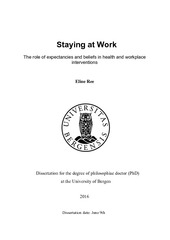| dc.contributor.author | Ree, Eline | |
| dc.date.accessioned | 2016-06-21T12:17:35Z | |
| dc.date.available | 2016-06-21T12:17:35Z | |
| dc.date.issued | 2016-06-09 | |
| dc.identifier.isbn | 978-82-308-3318-6 | |
| dc.identifier.uri | https://hdl.handle.net/1956/12154 | |
| dc.description.abstract | Work is an important part of life for the working population, and thus the workplace is an important arena for health promotion. Since low back pain (LBP) constitute the main reason for sick leave among employees, workplace interventions should target these complaints. There is, however, limited evidence regarding prevention and effective treatments of LBP. Therefore, interventions should aim at preventing the negative consequences of LBP, such as sick leave, fear of movement, and inactivity, as research has shown that this is possible. This was the idea behind atWork, a back pain information and reassurance intervention at the workplace. The goal of atWork was to change employees’ negative beliefs about back pain, and increase their positive expectancies of being able to stay at work despite back pain. The intervention was based on the Non-Injury Model (NIM), which is developed to understand and treat common LBP. According to this model, the spine is a strong structure, and pain is seldom a sign of injury caused by strain or heavy loadings. Several studies have shown that interventions based on NIM are effective regarding return to work among LBP patients. However, more information concerning the effect of such interventions in preventing sick leave, in addition to knowledge of possible predictors of effect, is needed. Furthermore, participants’ experiences with such interventions would be helpful to increase knowledge of important and helpful aspects with the interventions. It is especially interesting to explore the role of expectancies and common beliefs about back pain, as these factors are specifically targeted in the interventions. The overall aim of this thesis was to increase knowledge about the influence of expectancies and beliefs in health and workplace interventions. The Cognitive Activation Theory of Stress (CATS) and NIM is the theoretical framework of the thesis. This thesis consists of three papers; two quantitative based upon data from the atWork study, and one qualitative based upon data from focus group interviews. The intervention was provided to all employees in the municipalities (approximately 3,500 employees), and 1,746 of these provided questionnaire data. Paper I was a cross-sectional study based on baseline data from atWork (n = 1,746). Paper III was a cluster-randomised controlled trial, where questionnaire data was merged with register data on sick leave up to one year subsequent to the intervention. Only those who consented to obtain register data were included (n = 846). Paper II was a focus group study with participants in an outpatient NIM-based intervention. Three focus groups with a total of 10 participants were conducted. The aim in Paper I was to examine the mediating effect of response outcome expectancies (helplessness and hopelessness) between physical workload and health and between education and health. The results showed that helplessness/hopelessness partially mediated the effect between workload and health for both genders, but the mediating effect between education and health was only significant in women. The aim in Paper II was to explore how a back pain information and reassurance intervention at an outpatient clinic contributed to increase articipants’ positive response outcome expectancies. Important aspects were trust in the lecturers and having the information delivered in a comprehensible way. Better understanding of their pain, that it was not a sign of a severe disease, changed their perceptions of how they could live with the back pain. The aim in Paper III was to explore whether the atWork intervention could prevent sick leave, and if expectancies, beliefs, and level of LBP could predict this effect. The results showed that the intervention could prevent sick leave up to six months subsequent to the intervention. Low levels of pain-related fear were the only variable that predicted the effect of the intervention. The findings from this thesis show that expectancies and beliefs are important to health, and targeting these factors in interventions can contribute towards participants coping better and staying at work. However, the effect of atWork on sick leave was only present up to six months. Future interventions should explore if repetition of the intervention message over time can result in a more long-lasting effect. In addition, environmental, structural, and social factors at work should be taken into account, in order to facilitate opportunities for the employees to cope and stay at work. | en_US |
| dc.language.iso | eng | eng |
| dc.publisher | The University of Bergen | eng |
| dc.relation.haspart | Paper I: Ree, E., Odéen, M., Eriksen, H.R., Indahl, A., Ihlebæk, C., Harris, A. Subjective Health Complaints and Self-Rated Health: Are Expectancies more important than Socioeconomic Status and Workload? International Journal of Behavioral Medicine. 2014;21(3):411-420. doi: 10.1007/s12529-013-9329-7. The article is available in BORA at: <a href="http://hdl.handle.net/1956/9676" target="blank">http://hdl.handle.net/1956/9676</a> | eng |
| dc.relation.haspart | Paper II: Ree, E., Harris, A., Tveito, TH., Indahl, A., & Malterud, K. How can a brief intervention contribute to coping with back pain? A focus group study about participants’ experiences. Scandinavian Journal of Public Health. 2014;42(8):821-826. This article is not available in BORA. The published version is available at: <a href="http://dx.doi.org/10.1177/1403494814554029"target="blank">10.1177/1403494814554029</a> | eng |
| dc.relation.haspart | Paper III: Ree, E., Lie, S.A., Eriksen H.R., Malterud, K., Indahl, A., Samdal, O., Harris, A cluster-randomized trial of a peer-based low back pain information and reassurance intervention at the workplace: The effect on sick leave and predictors of outcome. Submitted manuscript. This article is not available in BORA. | eng |
| dc.title | Staying at work. The role of expectancies and beliefs in health and workplace interventions | eng |
| dc.type | Doctoral thesis | |
| dc.rights.holder | Copyright the author. All rights reserved. | eng |
| dc.identifier.cristin | 1372415 | |
